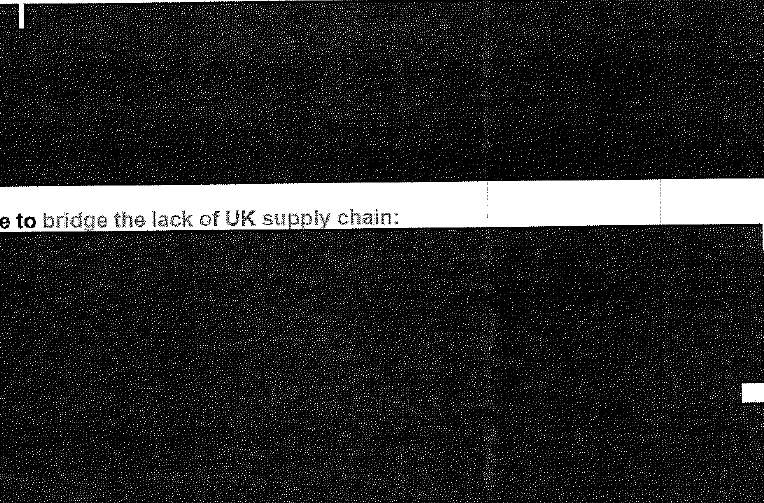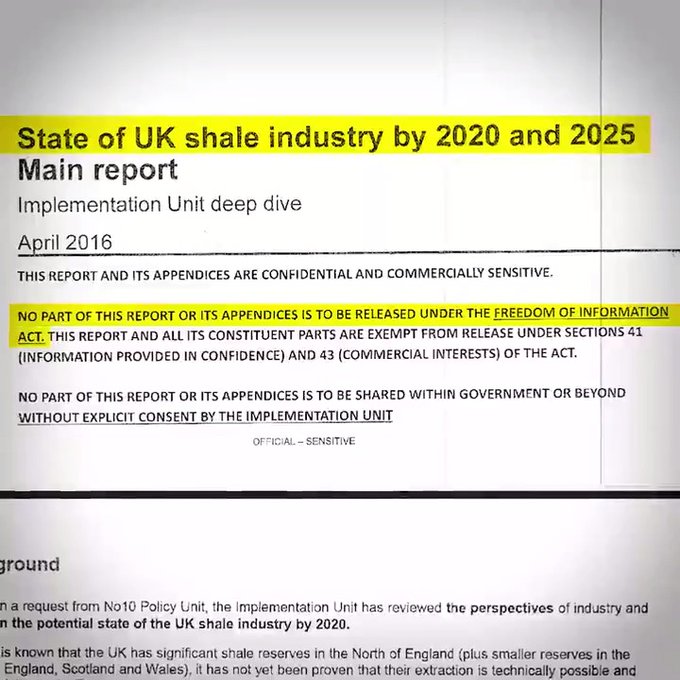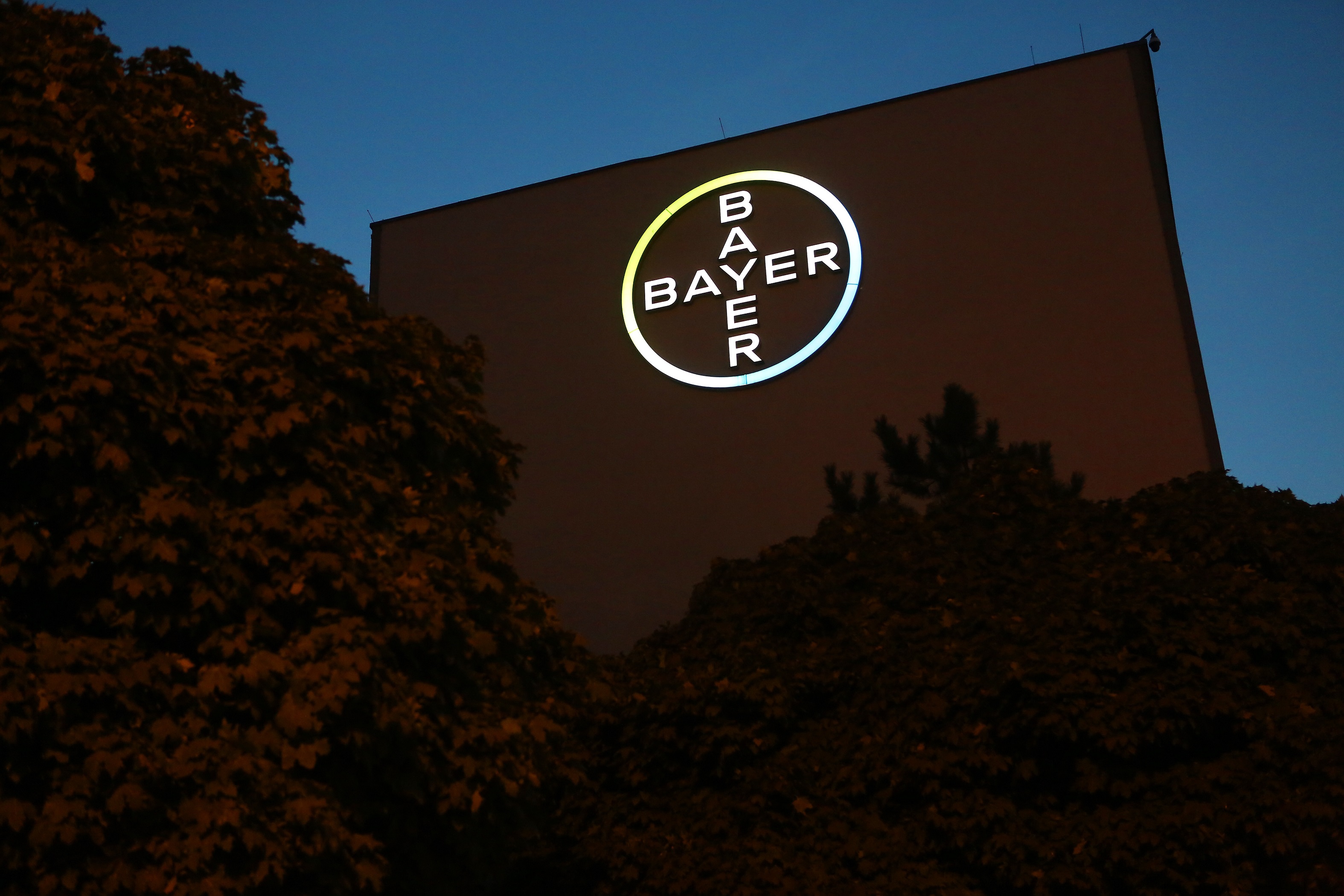Na 2
jaar de zaak te hebben tegengehouden heeft de Britse regering
eindelijk een geheim rapport over schaliegas- en oliewinning
'vrijgegeven....' Dat laatste tussen aanhalingstekens daar het
grootste deel van het rapport onleesbaar is gemaakt door diezelfde
Britse regering, ronduit een schandaal en het zet bovendien nog eens
extra vraagtekens bij de mate van democratie die de Britten
'genieten......'
Ronduit
onbeschoft zoals het geteisem in Londen omgaat met haar burgers,
immers de schaliegas- en oliewinning kent net als de aardgaswinning
slachtoffers, bovendien wordt met deze vorm van winning (van fossiele
'brandstof'), hele gebieden vervuild, evenals het grondwater........
Waar deze winningen hebben plaatsgevonden, blijft een maanlandschap
achter......
Voorts moeten chemicaliën ten behoeve van het fracken worden afgevoerd en dat betekent in de praktijk, zoals in de VS gebeurt, dat men het vervuilde water 'gewoon' laat weglopen in rivieren of zeeën en het zou me niet eens verbazen als men het ter plekke gewoon de bodem in laat verdwijnen..... Als deze afvalstoffen netjes vernietigd zouden moeten worden, zou alleen daarmee de prijs van schaliegas al fiks stijgen..... Daarover gesproken: er gaat een enorme bak subsidie naar de oliemaatschappijen die deze manier van winning in de VS en GB gebruiken.... Het laten weglopen van de troep richt veel schade aan, schade die amper is te herstellen, terwijl de gevolgen van deze schade in de nabije toekomst een enorme bak belastinggeld zal kosten.......
Verder komen bij het fracken grote hoeveelheden methaangas vrij, gas behorend tot de sterkste broeikasgassen op onze aarde en is een veel sterkere aanjager van de klimaatverandering dan CO2, daarmee is fracken een extra aanjager van die verandering in temperatuur..... (de kosten om de gevolgen van de klimaatverandering tegen te gaan en de schade te herstellen die ermee gepaard gaat, zijn al helemaal niet te berekenen.....)
Voorts moeten chemicaliën ten behoeve van het fracken worden afgevoerd en dat betekent in de praktijk, zoals in de VS gebeurt, dat men het vervuilde water 'gewoon' laat weglopen in rivieren of zeeën en het zou me niet eens verbazen als men het ter plekke gewoon de bodem in laat verdwijnen..... Als deze afvalstoffen netjes vernietigd zouden moeten worden, zou alleen daarmee de prijs van schaliegas al fiks stijgen..... Daarover gesproken: er gaat een enorme bak subsidie naar de oliemaatschappijen die deze manier van winning in de VS en GB gebruiken.... Het laten weglopen van de troep richt veel schade aan, schade die amper is te herstellen, terwijl de gevolgen van deze schade in de nabije toekomst een enorme bak belastinggeld zal kosten.......
Verder komen bij het fracken grote hoeveelheden methaangas vrij, gas behorend tot de sterkste broeikasgassen op onze aarde en is een veel sterkere aanjager van de klimaatverandering dan CO2, daarmee is fracken een extra aanjager van die verandering in temperatuur..... (de kosten om de gevolgen van de klimaatverandering tegen te gaan en de schade te herstellen die ermee gepaard gaat, zijn al helemaal niet te berekenen.....)
Schaliegas-
en oliewinning zou als men alle milieuregels zou handhaven, veel te
duur zijn... Ach gelul, deze uitermate vervuilende methode van
winning is een gevaar voor mens, dier en natuur, dus gewoon niet doen, beter nog: verbieden!
Lees het
volgende artikel van Jasmine en dat werd geplaatst op Unearthed
(Greenpeace) en zie de arrogantie van de machthebbers..... Dit
rapport zou voldoende moeten zijn om een regering te laten vallen en
als dat niet gebeurt zou de kiezer de Tory Party moeten
afstraffen..... Helaas werkt het niet zo, de BBC maakt vooral veel
reclame voor de regering en gevaarlijke gekken als Boris Johnson en Nigel Farage, die het volk vertellen dat de klimaatverandering een sprookje is en dat we vooral
alles uit de bodem moeten slepen om te verbranden.......
Overigens is het bij ons niet veel beter, zie wat hufter Menno Snel van D66
heeft geflikt met de schunnige terugvordering van kosten voor de kinderopvang door de Belastingdienst en dan zo onbeschoft zijn te blijven zitten*, de
'vent' zou zich de oren van de kop moeten schamen!!! (terwijl de klokkenluider van de Belastingdienst die e.e.a. aan het licht bracht op non-actief is gesteld....)
Government finally releases secret fracking report
The
still-censored document reveals details of huge Whitehall effort to
support development of shale gas industry in the UK

The
Cabinet Office has finally released its – still heavily redacted –
secret report on the fracking industry, following a 22-month Freedom
of Information battle with Unearthed.
The document – produced by the Cabinet Office in 2016 but never published – confirms government and industry players were privately downbeat about the prospects for a UK shale boom, even as they talked up the sector’s potential.
Unearthed first discovered the existence of the report in early 2018, but its information request was rejected because the government claimed it “could call into question the industry’s viability.”
Following a hearing in July this year, the information tribunal ordered the government to release key extracts of the report. The government failed to comply with the order to publish on 25 November, but finally released the report late on Friday afternoon.
Though sections of the document have been unredacted, it remains heavily censored.
Jon Trickett, shadow minister for the Cabinet Office, told Unearthed: “This report clearly shows that the Tories have bent over backwards to serve the interests of big business, especially the oil and gas industry.
“The Conservatives have taken money from oil executives, trashed the rights of communities and enabled fracking companies to threaten their local environment.
“The fact they have tried to cover this up by redacting pages of critical information – like with their talks with the US over selling off parts of our NHS – further illustrates this Government’s contempt for the public.”
He added that a Labour government would ban fracking, expand the Freedom of Information act, and “introduce tough new transparency rules”.
The Conservative Party failed to respond to requests for comment.
(For PDF of this report see original article - you should rotate the page, if you use a laptop or other computer)
Ken
Cronin, chief executive of trade group UK Onshore Oil and Gas (UKOOG), said:
“This 2016 report reveals no new information of interest. It is
true that shale gas development in the UK has progressed at a steady
pace, although this is commensurate with the exploratory and highly
regulated nature of the industry.
“Since this report was [produced], the first hydraulic fracturing since 2011 has taken place, several sites have been constructed and tested across North Nottinghamshire and multiple planning applications have been submitted for further exploratory work across Derbyshire and Lancashire.
“As with any industry that involves development, our progress has been slowed by the local planning system. This is not a unique problem to shale within the energy sector. Onshore wind and solar have met with comparable delays where applications have been filed.”
The report’s release comes as the government has placed a pause on fracking, though activists fear the moratorium could be lifted by a Conservative government after the election.
Business Secretary Andrea Leadsom said the moratorium would remain in effect until “new compelling evidence is provided” regarding the serious seismic incidents drilling has triggered in the north of England.
The Department for Business, Energy and Industrial Strategy (BEIS) was unable to comment due to pre-election ‘purdah’.
‘Pro-shale
narratives’
The Cabinet Office’s report, which is based on interviews with 28 industry stakeholders, identifies “low public acceptance of shale” as the primary barrier to the industry’s progress.
This is described in the report as “public opposition driven by concerns re: local quality of life and safety, environmental protection, crowding out of renewables.”
Rather than address these concerns, however, the officials appeared to regard them as a communications problem.
The report notes that the now-defunct Department for Energy and Climate Change (DECC) was “already undertaking crucial work on communications to increase public acceptability of shale” such as the “development of pro-shale national/regional narrative” and “shale champions.”
Messages from companies were even fed into the government’s “longer term national communications efforts”.
This public opposition, the report claims, led to “a set of more practical ‘symptom’ barriers” that the Cabinet Office deliberated on how to lift.
Industry
lobbying
It
said: “Operators highlight that the most significant barriers by
far are the long decision timelines and uncertainty experienced in
local planning system.”
“Current and future operators stress that they will only bring forward large sites if current long planning times and perceived uncertainty is reduced – ie unless this can be resolved, UK shale will not take off even if geology proven.”
In response, the report discusses a range of possible measures to smooth and speed-up the permitting process for would-be frackers, including:
- improving “incentives to process application[s] in [the] 16 week statutory timeframe”.
- possibly “moving shale from local planning into national planning regime”
- reviewing “scope for accelerating planned DECC work on developing options for the settlement of shale long-term liabilities, to prevent this becoming a potential source of further delays in the local planning system in the future”
- pressuring independent regulator the Environment Agency to speed up permitting process “without increasing risk of judicial review.”
- exploring ways to make public consultations and the planning process “more predictable,” including receiving advice on whether they can “time out” statutory consultees who are late in submitting input and even “reducing resources [for local authorities] invested to request additional information from industry.”
Questions
over viability
Unearthed’s discovery of
the report nearly 2 years ago related to government’s internal
projections for the the growth of UK fracking, which turned out to be
far more conservative than the vast number of wells and wealth the
industry had predicted.
There is much in the Cabinet Office’s report that indicates government and industry players understood these growth forecasts could well be overblown, and the long-term viability of UK fracking remained unproven.
“The development of the UK shale industry over the next 5-10 years is subject to great uncertainty – most importantly because the viability of the UK shale reserves is not yet proven,” the report states.
It goes on to reference interviews with operators and industry experts that “suggest that the industry could close down quickly if early sites are unsuccessful. Developments in the next 5-10 years are therefore crucial to establish long-term viability of the industry.”
The extent of the detail provided in the report is that government expected 5-10 horizontal wells could by fracking by 2020, “with a realistic expectation being significantly closer to 5 than 20.”
With less than a month to go before 2020, we now know that even the government’s “realistic expectation” was excessively optimistic. There are currently no fracking sites producing gas in the UK, and the government has announced that it will not support future projects.
A far cry from the 4,000 wells by 2032 forecast in 2014, which still underpins industry projections 6 years later.
Here's the government's secret fracking report we've been fighting nearly 2 years for (wait for the punchline) bit.ly/34JJqdM

(voor de video in dit Twitterbericht, zie origineel)
Redactions
remain
The
revelations scattered through the report, however, should not
distract from the fact that the Cabinet Office’s report remains
heavily redacted.
37
of the 48 pages are fully censored and many of the others contain
significant redactions.
The
‘background’ page is effectively free to read and so to are major
extracts of the executive summary, and the occasional line from the
report’s body.
===========================================* Zie: 'Menno Snel (staatssecretaris D66) overleeft zonder enig ethisch besef debat over toeslag kinderopvang'
Zie ook:
'Milieugroepen buitengesloten van klimaattop Madrid'
'Het grootste olieveld ter wereld: niet in Saoedi-Arabië maar in de VS >> het Permian-bekken'
'Britse banken steunen kolenverbranding met 25 miljard pond'
'Klimaattop Madrid: de grote vervuilers hebben veel te veel invloed'
'Frans Timmermans (PvdA Europese Commissie) op de valsgroene tour'
'Frans Timmermans (PvdA, Europese Commissie) wakker geschrokken: wil geheel hypocriet belasting op kerosine'
'Klimaattop Madrid bij voorbaat mislukt'
'Shell en Exxon die ondanks eigen onderzoek niets hebben ondernomen tegen klimaatverandering, willen met subsidie CO2 opslaan in lege gasvelden'
'IETA, lobbygroep van oliemaatschappijen en andere grote vervuilers, manipuleert klimaattoppen'
'Shell houdt zich niet aan het klimaatakkoord: 8 bewijzen'
'Rutte 3 heeft gelogen over subsidies: jaarlijks 2,5 miljard euro belastinggeld naar olie, kolen en gas'
'Bas Eickhout ('GroenLinks' EU) was vanuit Bonn wel tevreden over het Rutte 3 regeerakkoord..........' (dezelfde Eickhout die als grofgraaier in de EU stemde voor het langer toestaan van het kankerverwekkende gif glyfosaat, onderdeel van Roundup.....)
'Uniper (energiebedrijf van Finse staat) bezig met rechtszaak tegen Nederlandse staat voor sluiten kolencentrales'
'Exxon in VS onder vuur vanwege de al decennialang voorradige kennis over de menselijke hand in de klimaatverandering'
'Universiteit van Cambridge overstag: 6 miljoen pond voor onderzoek naar oliewinning t.b.v. Shell'
'Amazonegebied in brand, Black Rock verdient daar vele miljoenen mee'
'Kees Verhoeven (D66 2de Kamer) wil een grote EU, maar 'alleen op de grote onderwerpen...' ha! ha! ha! ha! ha! ha! ha!'
'Klaas Valkering (CDJA en 'hip haar'): het CDA heeft een eigen duurzaam beleid....... ha! ha! ha! ha! ha! ha! ha! ha! ha! ha! ha! ha! ha!'
'PvdA, CDA en VVD willen zich niet bij het klimaatakkoord van Parijs neerleggen!!!!'




